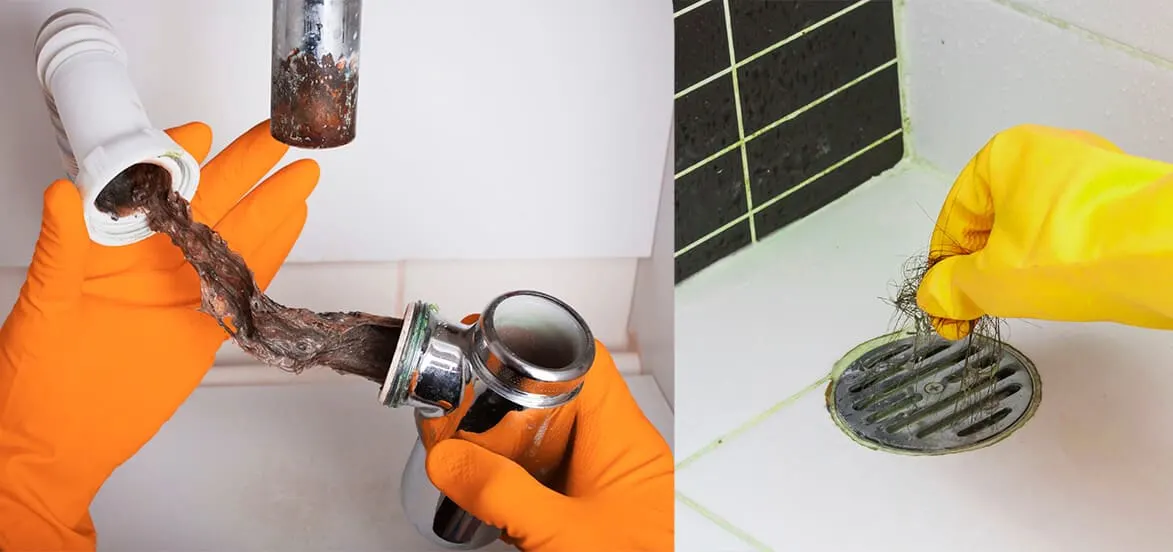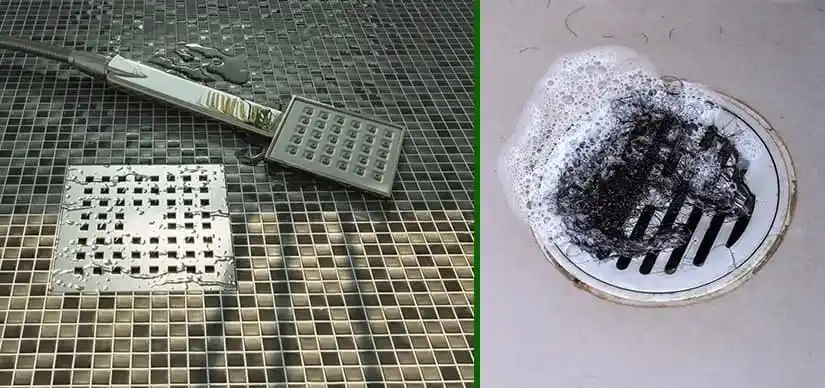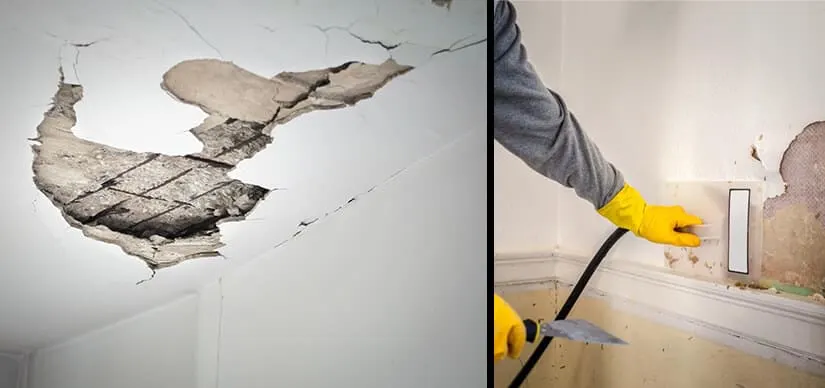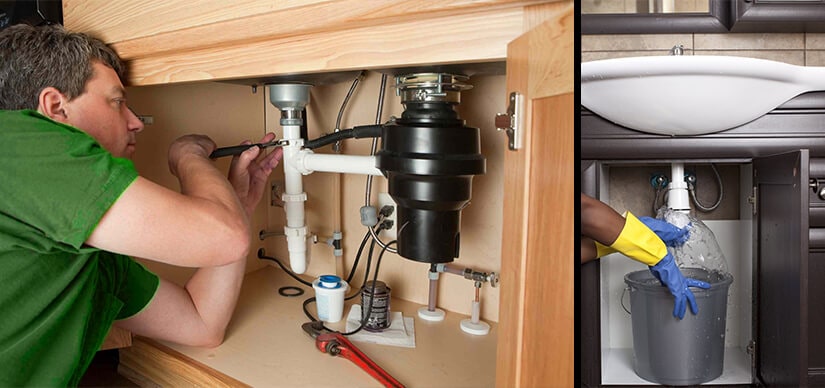How To Unclog A Drain And Keep It Unclogged
Views : 1096

A clogged drain is one of the most vexing plumbing issues that homeowners face. Whatever the cause of the clog, it is always inconvenient when it occurs. The good news is that you can avoid serious clogs and unclog your drains and pipes. Here are some of the most common causes of clogged drains, as well as tips on how to avoid them and unclog drains.
The main point is that you should never pour harsh liquid chemical drain cleaners down your drains. They may provide temporary relief, but they can seriously damage your home’s plumbing system and emit harmful fumes.
What Causes Clogged Drains?
Not all clogs are created equal. Fat, oil, and grease (FOG) buildup, food particles, or a combination of the two can cause clog in kitchen sink. Grease and food particles adhere to the inside of the drainpipe over time, accumulating and slowing the flow of water in the same way that cholesterol and plaque block arteries.
Bathroom sink and shower clogs are almost always caused by a combination of soap scum and hair, which cling to the insides of bathroom drain in the same way that fat, oil, and grease clog kitchen sink drains. When hair strands become entangled in soap scum, a clog can form quickly.
When you add beard stubble and shaving gel, as well as food particles and toothpaste from brushing, the clot thickens. Running enough water down the drain to carry this gooey mixture past the P trap (the U-shaped piece of pipe beneath the drain) and into the larger sewer line is the first step in prevention.
Here are some of the most common causes of clogged drains, as well as how to avoid them:
F.O.G.
This condition is so common that it has its own abbreviation: F.O.G. Fat, oil, and grease (or F.O.G.) have no place near your drains. When these noxious cooking byproducts enter your drain, they cool and solidify, forming a stubborn (and disgusting) blockage. F.O.G. clogs form quickly, causing pipe damage, leaks, and even flooding. So, you need help from an instant clogged drain cleaning service.
How To Avoid An F.O.G. Clog:
The best way to avoid clogging your sink or garbage disposal drain with fat, oil, or grease is to never pour them down the drain in the first place. After cooking, pour the byproducts into an empty container, such as a coffee can, to dispose of them properly later. Before rinsing your pots and pans, use a paper towel to soak up any excess F.O.G.
Hair And Animal Fur
Hair is another common cause of clogged drains, particularly in showers and bathtubs. If you have pets and bathe them in your bathtub or sink, animal fur can also cause a significant clog. Loose hair and fur combine with soap scum in the pipes to form thick, persistent clogs.
How to Prevent a Hair Clog
To be honest, if you have hair wash and take showers, hair will get into your pipes. By using a drain screen, you can reduce the amount of hair that enters your pipes. However, brushing your hair before getting in the shower can help reduce hair clogs in your drain.
To keep your pipes clear and healthy, invest in yearly drain cleaning services from a professional plumber. This will help your pipes, drains, and plumbing system last longer.
Paper Products, Toilet Paper, And Wipes
Toilet paper is the only paper or hygiene product that should be flushed down any of your drains, and even then, not in large quantities. When you see the word “flushable” on a container of wipes or paper products, you should be skeptical.
If the paper product does not completely degrade, it becomes clogged with soap scum, hair, and whatever else is in your drain. You’ll have a monster clog in no time.
How To Prevent A Paper Clog
Simply throwing your paper products in the trash or recycling bin will protect your pipes and prevent flooding in your home.
Soap Scum
Soap scum is another major cause of clogged drains. As soap residue sludges down the drain, it adheres to the inside of your pipes, frequently mixing with hair and other materials. A clog is unavoidable when this occurs.
How To Prevent A Soap Scum Clog
When taking a shower or bath, use a drain screen or mesh trap to keep soap scum from clogging your drain. This eliminates the majority of the soap and hair that goes down the drain, resulting in far fewer clogged bathtubs and shower drains.
You can also keep the drain in your bathtub or shower clear by hiring a professional drain service once a year.
Food Scraps
Food scraps are a major source of clogged sinks and garbage disposals. These chunks get caught in the drains and continue to accumulate until you have a massive clog on your hands. You should also be cautious about the types of food you put down the garbage disposal because some are worse than others.
Eggshells, tea leaves, coffee grounds, pasta, and rice should not be thrown down the garbage disposal because they can get caught on soap scum and other obstructions in your pipes, resulting in a severely clogged sink.
How To Prevent A Food Scrap Clog
Avoid using your sink drain to dispose of garbage. It’s also great idea to use a drain plug, cover, or screen to prevent food scraps from entering the drain.
Mineral Build-Up
Mineral build-up in the system is a major cause of clogged drains. Mineral build-up can be an extremely expensive problem in hard water systems. Hard water minerals accumulate in your pipes over time, resulting in reduced water pressure, sluggish flow, and clogged pipes.
The mineral build-up also harms water heaters, eventually wearing them out. Mineral build-up in your plumbing system is something to keep an eye on, so you aren’t surprised by high plumbing bills.
How To Prevent A Mineral Build-Up Clog
The prevention of clogs caused by mineral build-up is critical to the health and longevity of your pipes and drains. The installation of a water softener is a critical first step. A water softener will help you get the most out of your pipes and drains if you have hard water.
Your pipes should also be inspected and cleaned at least once a year. Our professional drain cleaning services include sewer camera inspections, which allow us to see inside the pipes. It allows us to monitor any mineral build-up and develop a customized maintenance plan for your specific situation.
Investing in a tankless water heater will help you avoid mineral build-up in your water heater. This ingenious system eliminates the risk of mineral build-up in your heater and lasts significantly longer than traditional tank heaters.
Non-Caustic Solutions To Unclog A Drain:
Hot Water And Detergent
A FOG clog responds best to a solution of near-boiling water and liquid detergent. Bring two quarts of water to a boil, then remove from the heat and set aside for a minute. Then, add four or five tablespoons of liquid dishwashing detergent. Pour the solution slows down the clogged drain, followed by hot tap water.
Hot water softens the fat, oil, and grease, while detergent dissolves it. You may need to repeat the process several times depending on the severity of the clog.
Hot Water And Salt
Unclogging kitchen and bathroom drain with table salt and near-boiling water can be effective. The hot water softens and melts the buildup, while the salt’s abrasiveness works to remove it.
Boil two quarts of water first, as with the hot water and detergent solution. Pour a half cup of table salt down the clogged drain, followed by a slow pour of hot water. After that, rinse with hot tap water. This procedure may need to be repeated several times.
Biological Drain Cleaners
A variety of biological drain cleaning products are commercially available for the safe and effective treatment of clogged or slow drains. These products contain enzymes, bacteria, or both that attack organic matter in clogs.
Biological products are effective at clearing clogs in kitchens and bathrooms, and they are also safe to use in septic systems because they do not harm beneficial bacteria. Regular use will aid in the prevention of clogs.
Conclusion:
A clogged drain or gutter can be the source of a slew of other issues. It is best if you can find a way to unclog a drain and have it cleaned as soon as possible. A professional sewer cleaning service will also assist you in removing any foul odors or damage. They may also provide you with advice on how to avoid similar problems in the future.
Read More- The Most Common Types of Drain Clogs




.jpg)